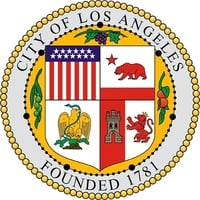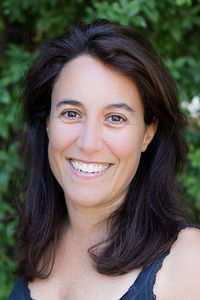Monday, June 2, 2014
Entrepreneurship In The LA Mayor's Office, With EIR Krisztina Holly

Last month, Los Angeles Mayor Eric Garcetti created a new program, aimed at growing, assisting and sustaining entrepreneurs in Los Angeles. The new "Entrepreneur-in-Residence" program has appointed its first, two, EIRs--Krisztina "Z" Holly and Amir Tehrani.--both of whom are working on independent efforts in the area of bringing the city closer to entrepreneurs. We spoke with Kristztina "Z" Holly--most recently, Vice Provost for Innovation at USC--about what Mayor Garcetti's EIR program is all about, and her vision for how it might help shape the industry in Los Angeles.
What exactly does the position of EIR involve?
Krisztina "Z" Holly: It's actually an initiative and program I've very excited about. It was initially the brainchild of the mayor, who reached out to ask how we could make this program work. In a sense, it's a work in progress. The other EIR with me, Amir, is also going to experiment with this over the next year. We're both doing what our EIR role is, and also in a sense defining exactly what that would be. It's going to be at least a three year program, and is being funded by Ernst & Young for those three years. It's pretty exciting. We're each going to focus on one or maybe two projects. My focus is going to be at the intersection of entrepreneurship and manufacturing.
Why did you pick entrepreneurship and manufacturing?
Krisztina "Z" Holly: The reason I picked that, is because there is a huge opportunity here in Los Angeles. Most people in Los Angeles don't realize that it's the largest manufacturing center in the country, by a factor of two. There are a huge number of shifts globally, which are making manufacturing relevant again. It's not going to look like manufacturing as we knew it. There are several new things happening, including the maker movement, crowdfunding, and the democratization of innovation, which will mean more startups and more demand for manufacturing. There's also the rising cost of manufacturing overseas in China and elsewhere, and a desire to keep iterating products locally. That makes local manufacturing relevant, particularly for smaller production runs. Also, the U.S. is leading the way in advancing manufacturing technology, with more automation, and more productivity. There's an opportunity for Los Angeles to capture the opportunity in this new future of manufacturing, if we understand what the new trends are, and adapt to these new opportunities.
You mention we're actually a big manufacturing center -- what industries are you talking about?
Krisztina "Z" Holly: The industries include aerospace, fashion, and apparel; food, automotive, and furniture, to some degree. In pretty much all of those areas, except maybe furniture, we're the leader. To some people, automotive might be surprising, but we're the leading center for automotive design and automotive accessories. A lot of people think of Los Angeles--rightfully so--as a creative hub, and just equate us with media and entertainment. However, I think that definition will shift to include physical goods as well. Los Angeles is poised to play a huge role in that area. People talk now about the cloud, and things coming in the cloud. I think you'll see in coming years as technology become available, that manufacturing is also going to start moving to the cloud, as well. That makes the opportunity for creating physical things much more akin to creating things like media. That's very much part of our DNA here in Los Angeles.
What attracted you to this role as EIR?
Krisztina "Z" Holly: I thnk that for many years, both in my five or six years at USC and on my own, I've been trying to bring people together, and promote the idea of things like the Maker movement, and bringing TechShop to Los Angeles. There's a huge opportunity for manufacturing in Los Angeles. It happens that my very first job was in the advanced manufacturing group for the space shuttle main engine here in Los Angeles, and I'm familiar with the manufacturing sector, before I ended up becoming and entrepreneur. Now that I'm part of the mayor's effort and the mayor's office, I have an opportunity to be a bit of a troublemaker here. As an entrepreneur in the Los Angeles ecosystem, that's an exciting role for me. I have always enjoyed playing at the interface of large, bureaucratic organizations--whether that's at a company, a university, or the government--and the entrepreneurial community.
Speaking of government, what do you think is the role of government in technology startups/venture capital, an industry which usually isn't too happy with government?
Krisztina "Z" Holly: I think that government can play a really important role. The federal government, for example, has played a really important role, which is often not completely recognized, in supporting and funding early stage research. That's because, typically, the private sector is the one commercializing that technology. Talking specifically about what the city can do, and what levers I have, I have to say I am only here for a year, so my goal is to convene thought leaders together, bring people together, and help them give each other perspective and connect with each other. I hope we can make some policy recommendations around this. My hope is that by identifying and putting into place certain partnerships, with the private sector, nonprofits, universities and other educational institutions, we can help advance lots of these initiatives. The truth is, the mayor has no budget for new programs. It's just an incredibly lean machine. You would not believe how lean. So, we can do things like convene thought leaders together, and change policies, whether that might be land use policy and other areas where government does really play a big role. An example of land use, is that most people do not realize that industrial land is in scare supply. As we've been converting and rezoning that land from residential live and work areas to just residential areas, those areas don't create jobs anymore. That's an area that government can help to help support the private sector, and help support both entrepreneurs or large companies.
Anything you'd love to see happen by the time you're done with your role?
Krisztina "Z" Holly: I've just barely started, but I can see some possible strategies. I really want to see, and hope to see us encourage the Maker movement here in Los Angeles. It's been under the radar quite a bit. I think we can help, and the mayor is partnering with the White House, as one of the original Maker Mayors to support the maker movement locally and encourage mayors around the country to do the same. We can do that by highlighting existing Maker spaces, and lower the hurdles for TechShop here. We can help match Makers and venues, and we can really encourage the Maker movement. We can encourage hardware startups, and other people who create and design physical goods, to start in Los Angeles, which will help create demand for manufacturing capabilities. That will allow them to draw on Los Angeles manufacturing or elsewhere, but help round out that ecosystem. I'm also hoping we can identify ways to make the manufacturing sector here become more competitive, and use the mayor's voice to promote these concepts and help connect the supply chain together. And, one crazy thing I'd love to see, is for Hollywood to play a role. They can use that soft power they have, to help send the message that production and manufacturing is really sexy, and there really are opportunities here in Los Angeles. I hope to get people not just in Los Angeles, but people around the world to help with the policy recommendations, and put in place partnerships to make this initiative sustainable well beyond my time here as EIR.
Thanks, and good luck!